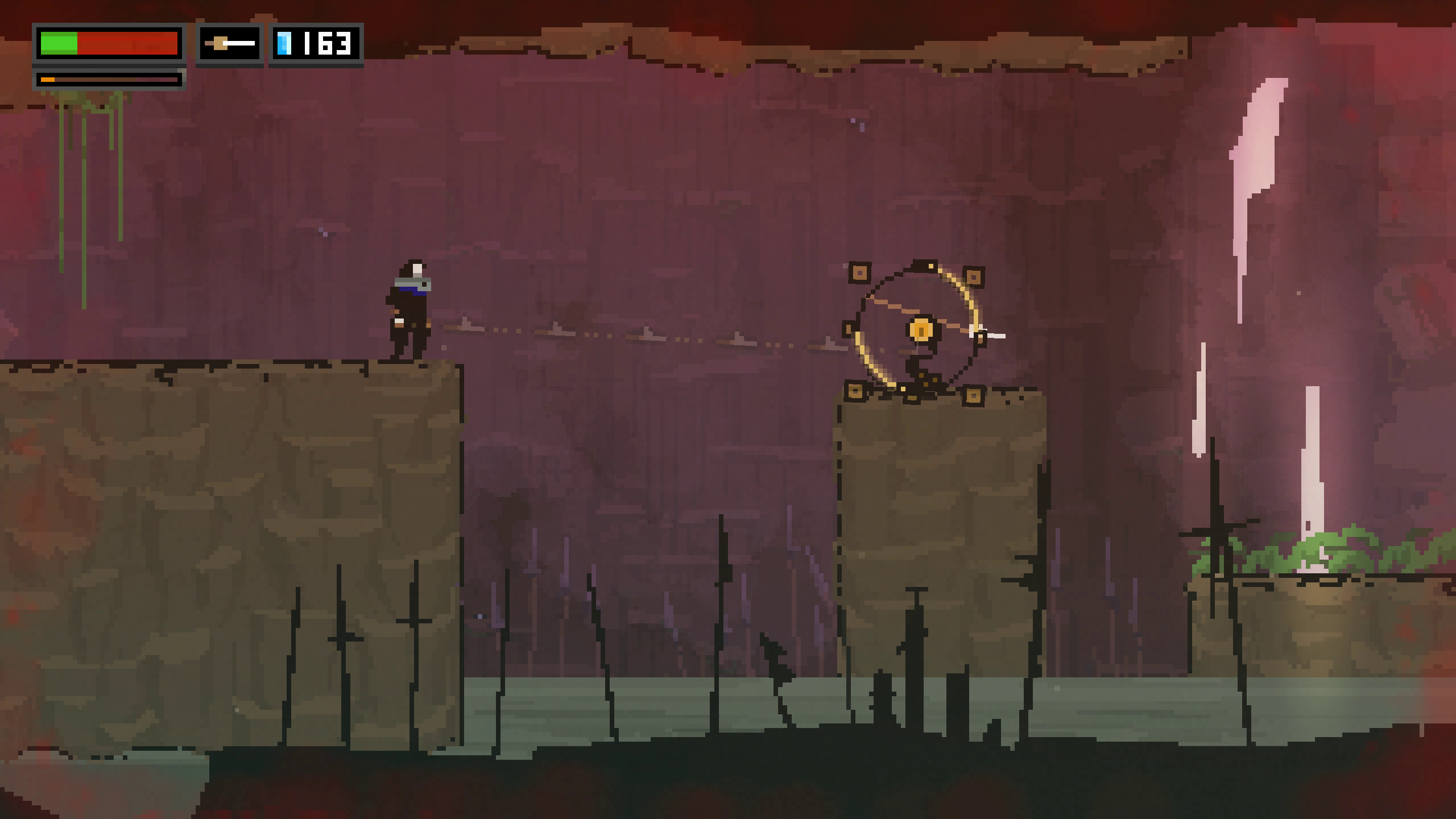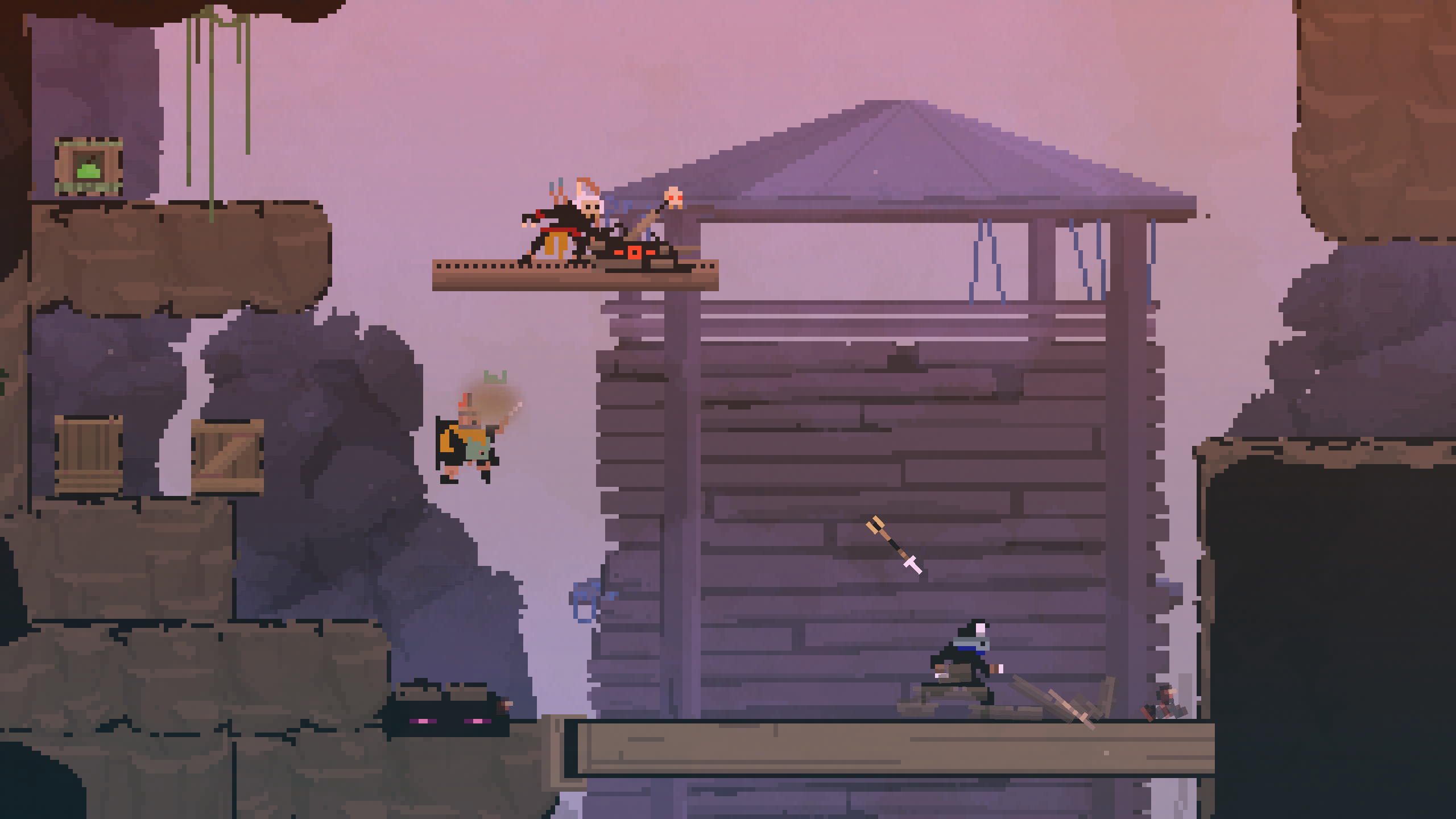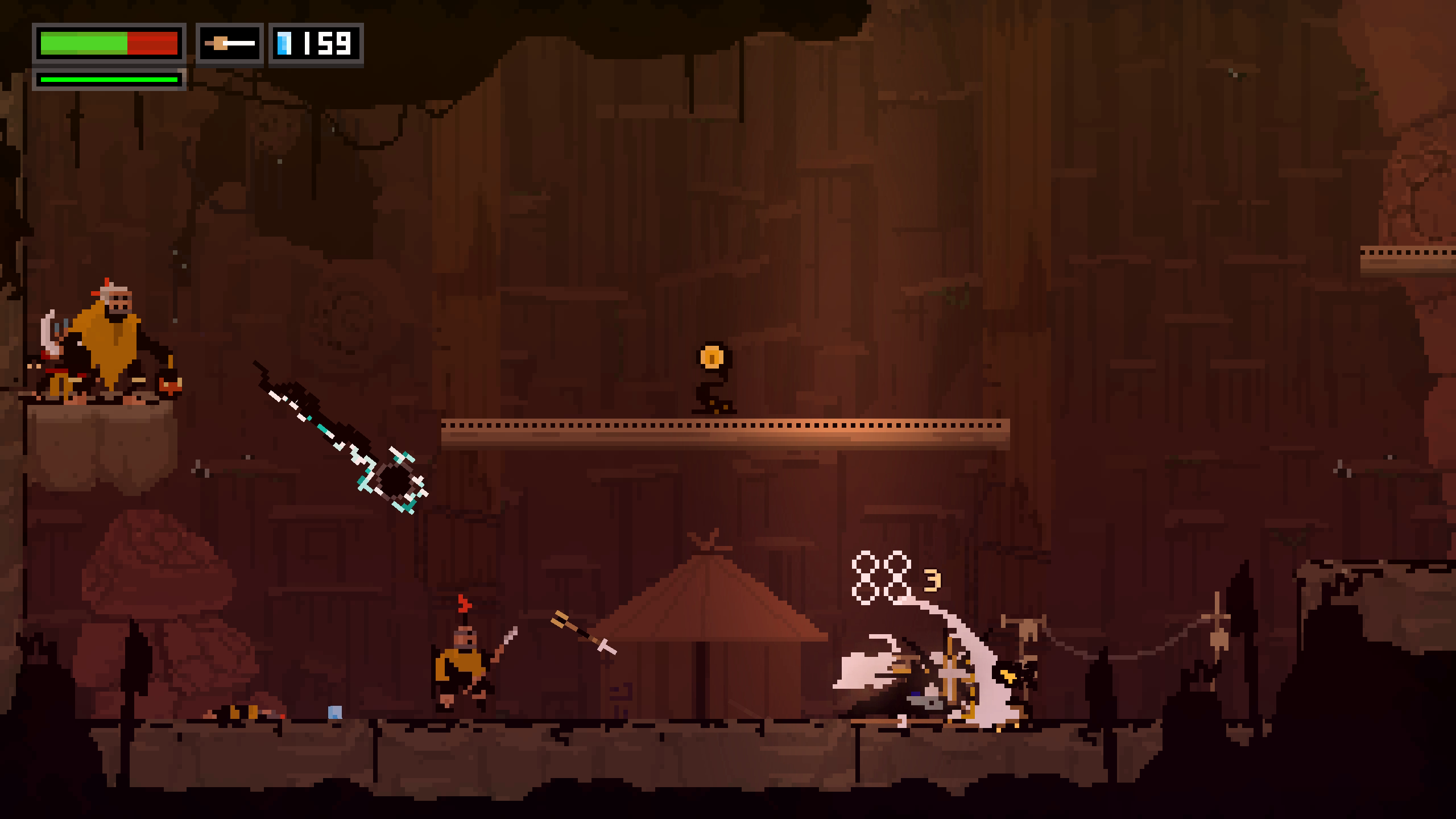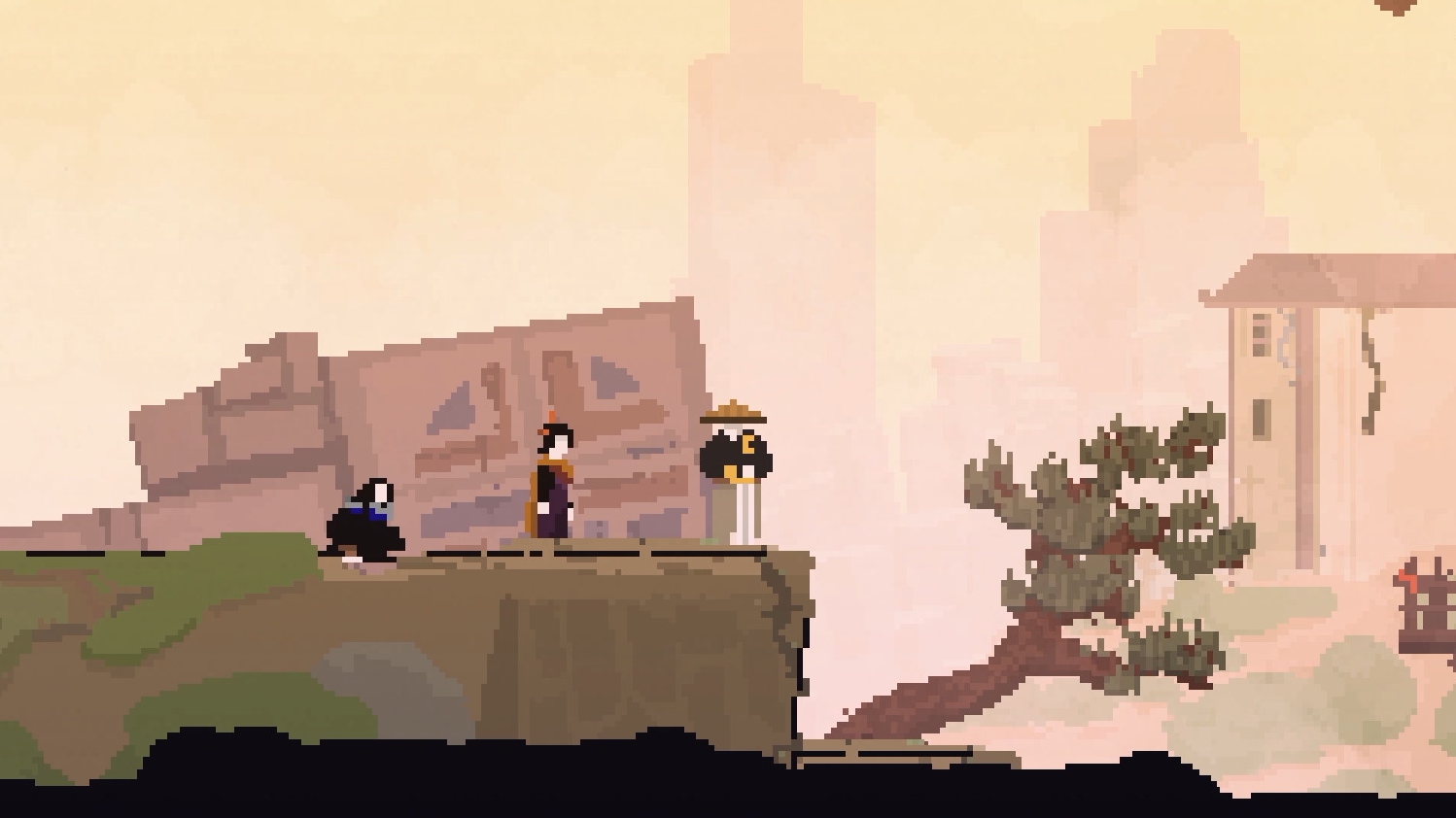Our Verdict
Olija spearheads a grimly thrilling adventure which is over too soon.
PC Gamer's got your back
What is it? An atmospheric action-adventure with a grapple-harpoon
Expect to pay $15/£13.49
Developer Thomas Olsson / Skeleton Crew Studio
Publisher Devolver Digital
Reviewed on Intel i5-6600K / Nvidia GeForce 1070 / 16GB RAM
Multiplayer? No
Link Official site
Grapple hooks are fun's rosetta stone. Let's stop just shy of saying every game should have one (though all games should have one), but it's always worth appreciating how expressive they are as a mechanic. Do they attach to everything, or just enemies? Or just ledges? Do they immediately start moving you, or do you get to choose? Are you physically transported, or are you teleported there; or does the thing you grappled move instead? Is it taut or does it flex and wind around objects? What exhilarating flavour of mastery does it leave you feeling?
Let's also celebrate the fact that this exalted genre has a new entry. Olija's harpoon grapples on to enemies and orange-eyed black tentacles, and you can teleport to it with a slash, a simple design which sits at the centre of this darkly atmospheric action-adventure as both a combat tool and a way to traverse its levels, and which constantly delivers a sense of choice and movement.
It's not without issues. Olija's harpoon can be fiddly because it requires two separate double-inputs, first to throw it, and then to push in its direction while hitting the throw button again to teleport to it. Hit the throw button without a direction and it'll return, losing its position. In the thick of battle, it's easy to spam the button and find yourself fighting without the harpoon, which is your main weapon, or failing to teleport.

Still, the harpoon made me feel powerful, and besides, Olija's combat isn't precision-driven. It's more about mobility: harpooning past a bunch of fodder enemies to get to a more dangerous ranged one and hitting it to fill a combo meter, and then harpooning out of harm's way. There are subtleties: you can switch between several secondary weapons, including a rapier, crossbow and a shotgun, which can deliver powerful finishers. Olija's combat is direct and weighty, and often a little chaotic as you face room-fulls of foes which snipe from afar, teleport away, or counter your combos.
You play as Faraday, a European whaler whose ship has been wrecked. What remains of his crew is now stranded on an island called Terraphage, which lies in seas ravaged by the demonically infected Clan Rottenwood. Here, once-glorious temples and places of learning are now decaying; its remaining heroes only speak in gnomically taciturn non sequiturs. The people have fallen to pathetic and mewling shades, now only fodder for exploitation and slaughter—often by you as they stand between you and Clan Rottenwood's soldiers. And, as the wielder of the magic harpoon, what if you have become the bad man?
Look, Olija is very Souls. But it's also very Blazer. Terraphage is the hub where you'll heal up and craft ammo for your secondary weapons between excursions into locations scattered across the seas. It's a setup that nods to Quintet's quietly legendary Soul Blazer trilogy, a series of action games released on SNES between 1990 and 1995 in which you, the hero, would delve into dungeons and see your actions change the towns from which you set out. And so in Olija I freed captured castaways and later found them back at Terraphage, giving me the satisfying feeling that my actions are establishing a thriving community.

You're out to find the three blue keys which will open the Shadow Gate so you can sail home again. But the blue keys lie behind barriers which require two or more yellow keys, which you'll find as you delve into each location. Levels aren't sprawling metroidvania affairs, but you'll find branching paths which lead to different goals, lending them a sense of depth and choice, and you can generally revisit them to hoover up materials and cash you can use to craft ability-granting hats and buy upgrades.
Hooked
Olija only took me five hours to complete, though there's not an ounce of flab. Every moment is considered, whether it's devoted to revealing a torii gate in a misty bamboo grove, a puzzle, or a combat encounter. There are surprising and pace-shaking set pieces which mix up your expectations, and the action—between fighting Clan Rottenwood's goons, finding secrets, figuring out platforming and lever and door puzzles—flows so smoothly that I could easily have found myself finishing it in a single session.
In many respects, however, Olija is too lean, since it didn't fully give me a chance to explore all of the skills and tools it offers. By the end of the game, I'd only worn a couple of the hats and had barely used two of the secondary weapons. It introduces one powerful new item so late in the storyline that its potential felt unexploited.

Arguably, being left hungry for more is better than being bored of what you have. And it's easy to understand Olija's brevity, since it was made by just one person, Thomas Olsson, who also drew and animated its darkly beautiful pixel art and designed one of its true stars, its sound. Faraday's boots clunk along wooden boards; his blade schwings. Enemies cackle and bodies splatter. You can pick out so much detail amid the fights by sound alone, and its heft gives its world a physicality which pixel games often lack. The music, too: discordant smoky saxophones, mournful horns and strident strings, with a mix which favours subtle bass rumbles which both unsettled and transported me into this sad and wondrous world. What I'm saying is: Olija really rewards your subwoofer.
I was bowled over by the level of quality of all this one person has achieved. Olija is clearly Olsson's personal work, and its story, of Europeans lost in mysterious and frightening Eastern waters, in part reflects his own experience of moving from his birthplace in France to Japan to be with his wife. But I felt sometimes a disquieting air of orientalist fantasy, as we encounter an inscrutable culture headed by the beautiful Lady Olija, who we chase into submission. But I also loved the clash of rough and ready mariners facing a strange and terrible world of corrupted beauty. I only wish their voyage was a little longer.
Olija spearheads a grimly thrilling adventure which is over too soon.


